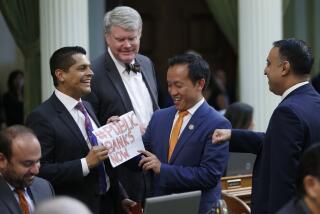Bidders for IndyMac need not be banks, FDIC says
- Share via
Should you have to be a bank to bid for Pasadena mortgage lender IndyMac Federal Bank or any other failed financial institution?
The Federal Deposit Insurance Corp., which has been unable to sell IndyMac since it was seized four months ago, said Wednesday it didn’t think so.
The FDIC, which has dealt with 22 failed banks and thrifts this year (including IndyMac on July 11 and Southland-based Downey Savings and PFF Bancorp last week), said it hoped to generate more interest by allowing nonbanks to join the auction process.
If it actually won the bidding for a failed institution, a nonbank bidder would have to get a bank charter and qualify for FDIC insurance before assuming the institution’s deposits. The federal Office of the Comptroller of the Currency, which regulates national banks, said last week that it would issue “shelf charters” to prospective bidders for failed banks, essentially clearing them in advance.
Bank consultant Bert Ely, based in Arlington, Va., said bidders would probably be the type of groups that start new banks -- a former bank chief executive or chief financial officer backed by “money people.”
IndyMac spokesman Evan Wagner said the Pasadena institution was hoping to solicit additional bids -- marking the latest in a series of revisions to plans to find a buyer. Since no buyer was found for IndyMac before it failed -- unlike the cases of Downey, PFF, Washington Mutual and others -- the FDIC has been stuck operating IndyMac.
The FDIC said initially that it hoped to find a buyer for all or part of IndyMac within three months. It later extended the deadline, with bids for pieces as well as for the entire thrift continuing into this month.
David Barr, a spokesman for the FDIC, said recently that the agency still hoped to have a deal worked out by sometime in December. He couldn’t be reached for comment Wednesday on whether expanding the potential pool of bidders would once again push the target sale date back.
--







